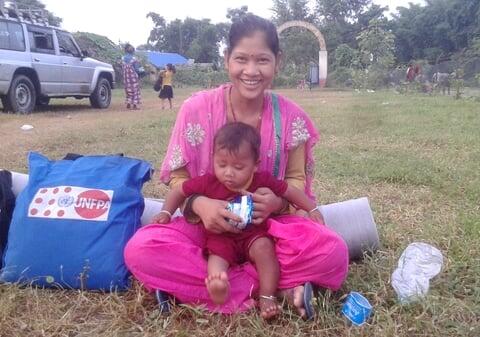BANKE, Nepal -- A 20-year-old mother was sleeping in her thatched hut with her baby when floodwaters came rushing in at midnight on 12th August. Her husband and other family members immediately took her and the six-month-old baby to the nearest high-lying area in Banke district.
While the entire family managed to escape from the rising floodwaters, Bismati Tharu lost her mud and straw-built house and all her belongings to the disaster. Ever since she started living in a shared tent following the floods, she had no spare clothes to change for herself and her baby.
In a crisis situation like this, the needs for shelter and food are rightly given urgent attention. The specific needs of displaced women and girls, however, are too often overlooked. Basmati’s family was among a total of 853 families (47,410 people) that were displaced by the flood in Banke district. Nearly 91,400 families (461,000 people) were displaced by the floods. Among the displaced population there was an urgent need to fulfill their hygiene needs and keeping pregnant, new mothers and menstruating girls healthy.
Soon after the floods UNFPA, the United Nations Population Fund, and members from the government-led protection cluster swung into action to address women’s hygiene and protection needs. The local authority in Bismati’s hometown, the Women and Children Office (WCO), distributed Dignity Kits supported by UNFPA. These kits contains essential supplies such as saris, warm clothes, reusable sanitary napkins, soap, toothbrushes, towels, underwear, washing powder, nail cutters and torch lights tailored to meet the specific needs of women and girls.
“These (Dignity Kits) are very useful at this time. I was in urgent need of it as I had no clothes,” says Bismati, who represents the one of the marginalized communities of Nepal — Tharu. “I had some inkling that someone would think of such support and come to us carrying these non-food items that are specially made for women like me”. Her village in Rapti Sonari Rural Municipality is one of the most flood-prone areas in Banke where monsoon unleashes flash floods almost every year.
As part of the immediate relief efforts, UNFPA in coordination with the WCOs distributed Dignity Kits to pregnant, new mothers and women with disabilities in Dang, Banke, Bardiya Sunsari, Saptari, Udayapur, Mohattari, Sarlahi, Rautahat, and Kailali to help restore their dignity and increase their mobility during the crisis situation. As of August 24 a total of 2,698 Dignity Kits were delivered to these 10 districts. Among them 1,397 were funded by the Government of Australia and the remaining were prepositioned in UNFPA’s offices as well as in Mohattari, Sarlahi, Sunsari, Udayapur and Dang by the WCOs. Dignity kits are meant to meet urgent needs for women not only to protect their dignity, but also to enable them to access further humanitarian services. It is thus essential that they are propositioned in areas prone to disasters like Bismati’s settlement.
At the temporary camp, Bismati has to cook, wash and gather water, nurture her baby and take care of her health. “I am facing a triple burden,” says the 20-year-old. Traditionally, women across Nepal take on the role of childrearing and handle household chores at the same time, which adds a significant amount of stress to the daily lives of disaster-affected women like Bismati.
Together with government agencies and humanitarian actors UNFPA is also disseminating messages related to protection issues, including gender-based violence, through local radio stations.
- Ram Thapa


